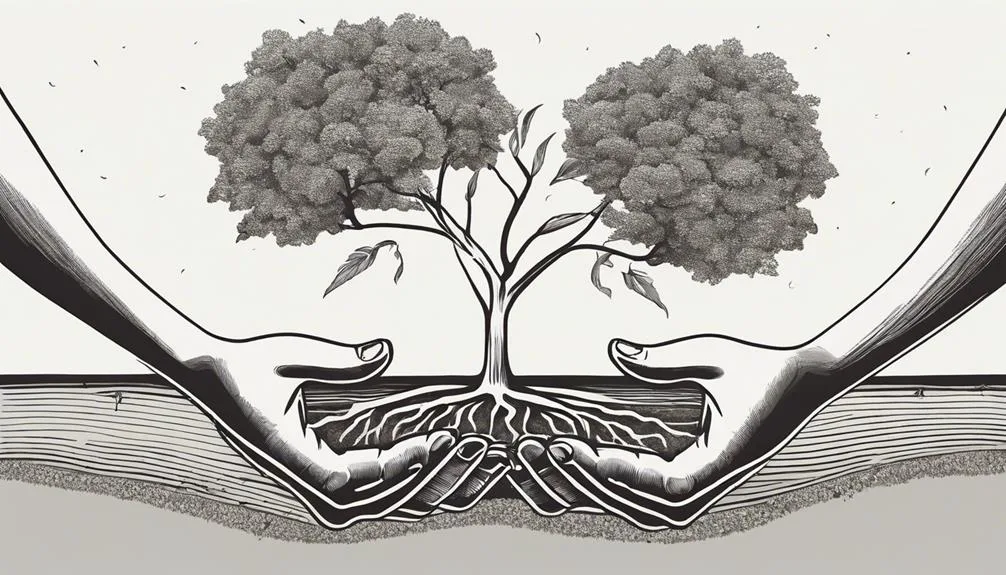Building trust in relationships is like constructing a solid bridge. It’s based on honesty, understanding, and enjoying good times together. This process involves clear communication, keeping your promises, and being open about your feelings.
Each action strengthens your connection with others. But starting and avoiding mistakes can be tricky. This guide will show you how to create lasting bonds in every aspect of your life.
Key Takeaways
- Practice honest and timely communication to enhance understanding and prevent misunderstandings.
- Demonstrate reliability by consistently keeping promises and acknowledging when you fall short.
- Respect personal boundaries and value quality time to strengthen connection and trust.
- Foster a supportive environment by actively listening, sharing decision-making, and celebrating achievements together.
Practice Honest Communication

To build trust in any relationship, it’s crucial to practice honest communication, speaking your truth without fear or hesitation. But it isn’t just about what you say; it’s also how you say it. Nonverbal cues, like eye contact and body language, play a significant role in conveying your sincerity and openness. They can reinforce the honesty of your words, making your message more believable and heartfelt.
Additionally, the timing of your feedback matters. Offering your thoughts and feelings at the right moment can prevent misunderstandings and build a stronger bond. It shows you’re considerate and truly engaged in the relationship. Remember, honest communication isn’t just about being truthful; it’s about being thoughtful and attentive in your approach.
Keep Promises Consistently

Building on the foundation of honest communication, keeping your promises is another key way to strengthen trust in any relationship. When you commit to something, whether it’s a small task or a significant promise, seeing it through matters immensely. Good time management is vital here. By organizing your commitments and prioritizing them effectively, you’re more likely to fulfill your promises. This consistency in keeping your word not only builds trust but also demonstrates your reliability and respect for the relationship.
Consider setting up a reward system for yourself as motivation to maintain this habit. Rewarding yourself for promises kept can reinforce positive behavior, making it easier to continue this practice. Remember, every kept promise is a step towards a stronger, more trusting relationship.
Show Vulnerability

Showing vulnerability allows you to open up and share your true self, fostering deeper connections and trust in relationships. It’s about taking emotional risks despite the vulnerability fear that comes with it.
Here’s how you can show vulnerability:
- Admit when you’re wrong or don’t have all the answers.
- Share your feelings, even when you’re afraid they won’t be reciprocated.
- Ask for help when you need it, acknowledging you can’t always manage alone.
- Discuss your fears and insecurities, rather than keeping them bottled up.
Embracing vulnerability isn’t easy, but it’s essential for building trust. It shows you’re human, capable of emotional depth, and committed to the relationship. Remember, it’s about balance and gradually opening up, ensuring both partners feel safe and respected.
Respect Privacy Boundaries

While embracing vulnerability strengthens connections, it’s equally important to respect privacy boundaries in any relationship. Honoring your partner’s need for personal space and time away from constant digital connection can greatly bolster trust. Consider integrating a digital detox into your routine, allowing both of you to enjoy moments without the intrusion of notifications or social media. This step shows you value the quality of your time together over the quantity of interactions.
Additionally, understanding the difference between secret sharing and oversharing is vital. Not every thought or experience needs to be shared. Respecting your partner’s choice to keep certain things private demonstrates trust and acceptance of their individuality. It’s about finding a balance that strengthens your connection without compromising personal boundaries.
Actively Listen

Listening intently to your partner’s words can greatly deepen your connection, demonstrating that their thoughts and feelings truly matter to you. Active listening isn’t just about hearing what’s said; it’s about fully engaging with your partner, showing you’re invested in understanding them.
Maintain eye contact to acknowledge you’re focused and present.
Nod or make small sounds to show you’re following along, highlighting the importance of feedback.
Pay attention to non-verbal cues, which can tell you more about how they’re feeling than words alone.
Confirm or summarize their points to make certain you’ve understood correctly, reinforcing feedback importance.
Express Empathy

Building on the foundation of active listening, expressing empathy allows you to truly connect with your partner’s emotions. When you explore into understanding feelings, you’re not just hearing words; you’re acknowledging the experiences and emotions behind them.
This process is a cornerstone of emotional intelligence, reflecting your ability to put yourself in their shoes, to feel what they feel. By doing so, you’re not only validating their experiences but also strengthening the trust between you. It’s about seeing the world through their eyes, without judgment or the rush to solve problems.
Demonstrating empathy involves careful consideration of your partner’s perspective, truly a proof of the depth of your connection and understanding. This approach fosters a supportive environment, essential for a trustful relationship.
Share Decision Making

Sharing decision-making in a relationship strengthens the bond of trust, as it demonstrates mutual respect and appreciation for each other’s opinions. When you both participate in making decisions, it’s not just about finding a middle ground; it’s about creating a shared vision for your future together. By engaging in joint planning and employing collaborative strategies, you pave the way for a more harmonious and balanced partnership.
- Jointly set goals: Discuss and agree on mutual objectives for your relationship.
- Collaborative strategies: Develop plans together, combining your strengths.
- Guarantee both voices are equally heard in every decision: Ensure both voices are equally heard in every decision.
- Shared responsibilities: Divide tasks fairly, respecting each other’s time and effort.
These steps foster a deeper connection and trust, making your partnership stronger and more resilient.
Apologize When Necessary

In any relationship, acknowledging when you’ve made a mistake and offering a sincere apology is vital. This act of contrition isn’t just about saying ‘I’m sorry’; it’s about expressing sincere remorse for your actions and their impact on another person. Timing apologies correctly is important. Wait too long, and the hurt may fester, damaging trust further. But rushing to apologize without fully understanding the situation or your feelings can seem insincere.
To truly mend fences, you’ve got to mean what you say. An apology should come from the heart, reflecting a genuine understanding of the wrongdoing and a commitment to making amends. By handling apologies with care, you pave the way for healing and strengthen the bond between you and your loved ones.
Celebrate Achievements Together

Celebrating each other’s successes, big or small, fosters a deeper connection and trust within any relationship. When you actively engage in goal setting together and then honor those achievements, you’re not only acknowledging the effort but also reinforcing your bond.
Here are some ways to make those moments special:
- Create achievement rituals, like a special dinner or a shared activity, that become a tradition.
- Offer genuine congratulations and show interest in the details of the accomplishment.
- Gift something that symbolizes the achievement, however modest it might be.
- Plan a surprise celebration with friends or family to magnify the joy.
Conclusion
Building trust in relationships hinges on straightforward yet profound actions:
- honest communication
- fidelity to promises
- embracing vulnerability
- respecting privacy
- engaging in active listening
- showing empathy
- sharing in decisions
- offering apologies when necessary
- celebrating shared successes
These steps are the bedrock of strong, resilient bonds.
As we navigate our relationships, let’s ponder the transformative power of trust: how might our connections flourish when we commit to these principles?
This reflection not only reinforces the article’s core message but also invites us to consider the lasting impact of trust on our interpersonal connections.

